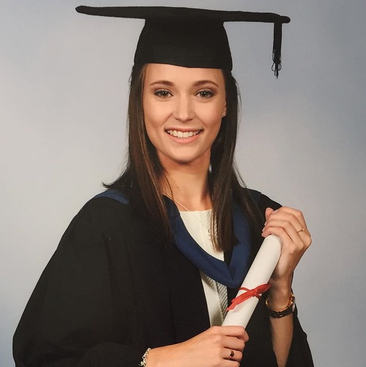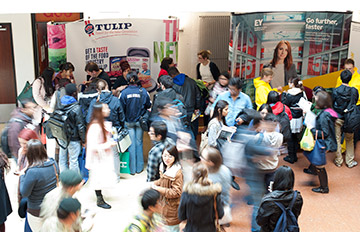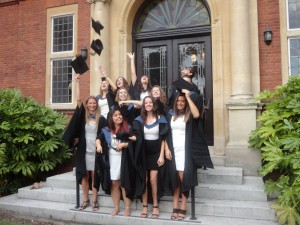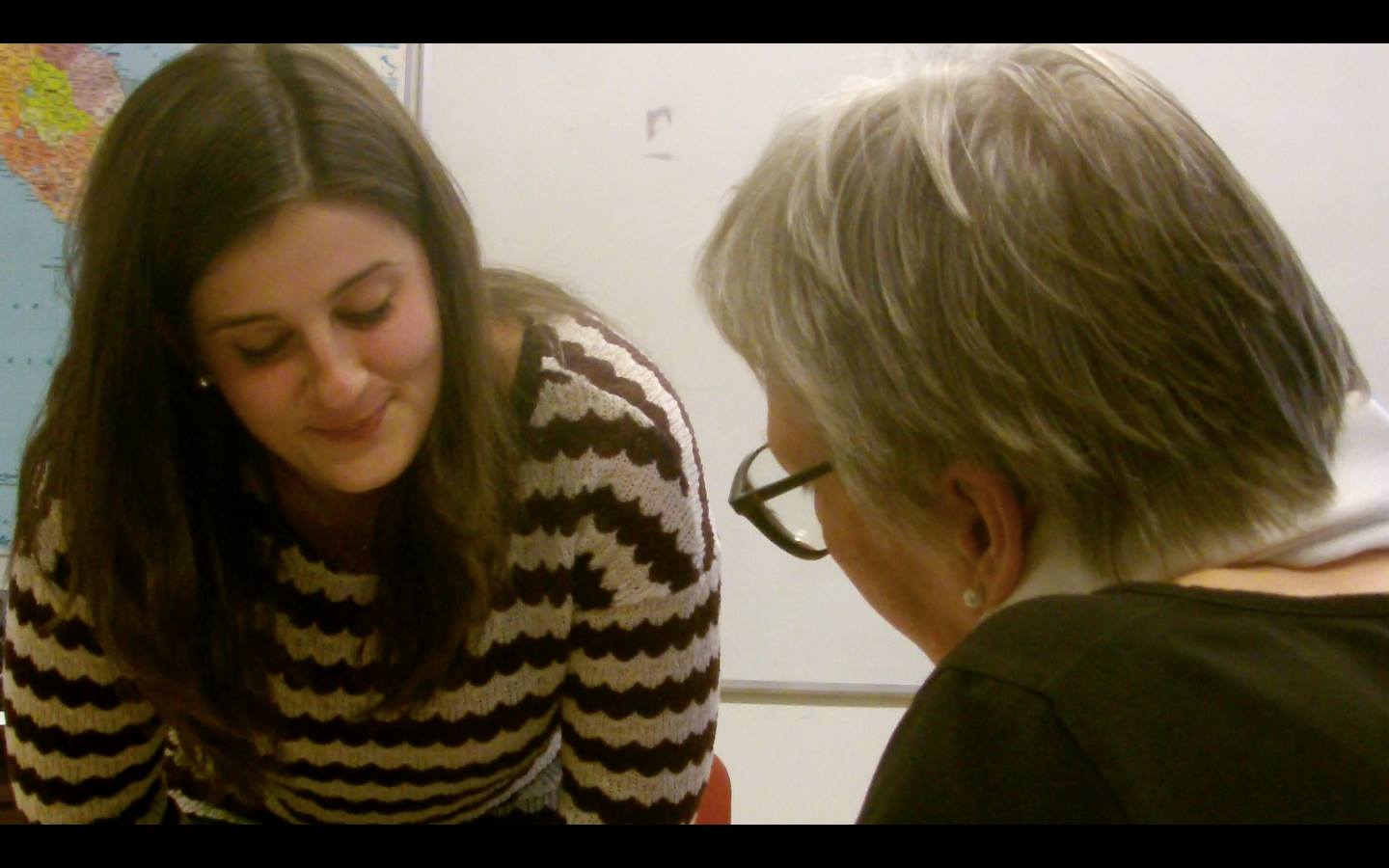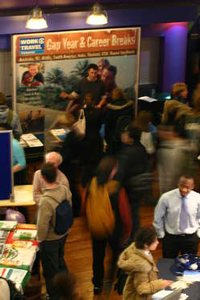With the graduation ceremony for the Department of Modern Languages and European Studies at the University of Reading just around the corner, there’s no better time to celebrate the successes of our recent graduates. This week we’re featuring an inspiring story from Alice Boulton, who earned her BA in Italian Studies in 2016, and who now works in fashion. We asked Alice to tell us how she found the transition from uni to her career, and how she thinks her languages degree has helped her in the fashion world. Here’s what she had to say:

Alice Boulton received her BA in Italian Studies from the University of Reading in 2016.
A degree in languages without a doubt sets you apart from many other candidates when applying for a job. Not only does it demonstrate your ability to learn, but it also exemplifies your ability to adapt and to conquer the many challenges that you may face. When people ask me what I studied, I always get the same response: Wow! I am so proud to say I earned my degree in Italian Studies at Reading. I know it played a huge role in how I secured my current position, and all of my prior positions as well.
I currently work as a Product Admin Assistant at the British clothing brand Boden. A PAA is essentially a hybrid between a Buying and Merchandising Admin Assistant, which allows me to gain the skills and knowledge to further progress in either field in the fashion industry. I spend my days switching between two lines in Womenswear, currently Accessories and Softs (basically garments like dresses and skirts), both of which vary greatly day to day. For the Merchandising side of my job, I do a range of tasks from creating purchase orders to our warehouses in the UK and US, ensuring new collections will arrive on time for launches and line drops, to minimising backorders and creating finance plans for new seasons. With the Buying team I create style plans, uploading new designs to our systems, ensuring all colourways, size ranges and style codes are correct, as well as checking each style on our website and catalogues are correct before going live, and creating comp shops; comparing competitor styles and prices to our designs for the upcoming seasons. Additionally, I make sure our showroom is prepared for fitting sessions and meetings with Head Buyers.
 I thoroughly enjoy my career. Boden is an amazing place to work. I love that each day is different, and I love the fast paced nature of the fashion industry. I find it really interesting how a product evolves from the initial ideas on a moodboard to the actual finished item. The fashion industry is a competitive field and one that constantly keeps you on your toes, but I truly believe my degree prepared me for the challenge. Throughout my studies, whether it was at Reading or during my Year Abroad, I was consistently using my initiative. Additionally, my knowledge of languages is important in my career, given Boden’s aim to expand further throughout Europe. It certainly helps that I can speak to our many Italian fabric suppliers in their mother tongue.
I thoroughly enjoy my career. Boden is an amazing place to work. I love that each day is different, and I love the fast paced nature of the fashion industry. I find it really interesting how a product evolves from the initial ideas on a moodboard to the actual finished item. The fashion industry is a competitive field and one that constantly keeps you on your toes, but I truly believe my degree prepared me for the challenge. Throughout my studies, whether it was at Reading or during my Year Abroad, I was consistently using my initiative. Additionally, my knowledge of languages is important in my career, given Boden’s aim to expand further throughout Europe. It certainly helps that I can speak to our many Italian fabric suppliers in their mother tongue.
I’ve always wanted to work within the fashion industry, but I never wanted to do a specialist fashion degree. I didn’t want to narrow my opportunities after university, especially if I eventually decided to pursue a different career path. I believe that a degree in languages offers endless opportunities for work, at home and abroad.

Alice Boulton and Milly Bolton on their Year Abroad in Florence
My degree in Italian undeniably paved the way to me securing this position. I was able to intern at the Italian fashion designer Ermanno Scervino during my time in Florence as part of my degree at Reading. During my Year Abroad I worked backstage at Milan Fashion Week during their catwalk, and gained experience in a fashion house. In addition, the Year Abroad helped me develop so many life skills, from improving my language to boosting my confidence in challenging – as well as in general-day-to-day – situations. After that, nothing feels too challenging. An interview in English? EASY! If you can enroll at a university overseas, take an exam in a foreign language, or debate over the phone to a late taxi driver in his mother tongue, you’ll find it easy to explain in English why you’re the right person for a job. That’s as simple as ordering your morning coffee.

Alice Boulton and Milly Bolton show off their well-earned first-class marks on their dissertations.
A lot of people think that a degree in languages is simply learning a language. It’s so much more. My degree covered the golden age of Italian Cinema way before the glitz and glam of Hollywood; the history of the Fascist period; the literary icons Dante, Boccaccio and Petrarch; the history of the Italian language; linguistics; poetry and literature from from the Medieval to the Post-War period; and so so much more. A languages degree is like every other degree mixed together along with learning a language, which is the cherry on top.
The Year Abroad was a fantastic experience, it’s hard to put into words just how great it was, I now return to Florence as much as I can, just to bring back that feeling of living there again. With such an array of topics to study overseas, you become agile and gain skills in a variety of subjects that mould you and allow you to jump into any industry, be it straight into work or in further education. My degree also gave me the confidence to apply for jobs in Italy, of which resulted me interviewing for a job in Florence, one which I would never have been able to do if I had not pursued this degree.

Alice Boulton, Milly Bolton, and Dr Paola Nasti
It’s almost impossible to pinpoint my fondest memories from my time at the University of Reading because there are just so many incredible times. I remember my daunting first language seminar, where I met Dr Chiara Ciarlo, who made me feel at ease straight away. I even remember visiting Reading for the first time and meeting the fabulous Enza (da Potenza) Siciliana Verruccio, and I knew this was where I wanted to go. I remember how Dr Federico Faloppa and Dr Paola Nasti managed to make Linguistics and Dante enjoyable. Dr Charles Leavitt, who was my tutor throughout my degree, managed to keep me grounded while I was writing my dissertation abroad. And Dr Daniela La Penna inspiring me with her extensive knowledge of the Italian poet Ungaretti (and so much more). Each and every lecturer that taught and supported me along the way, made my time at Reading unforgettable.
Graduation day was bittersweet, I had gained a degree and ready to move on into the world, but at the same time I was leaving a family and amazing memories behind.

Celebrating success with the staff and students of the Italian section at the University of Reading
If I could give any advice to prospective students it would be: Do it! You will not regret it. A degree in languages prepares you for so much. I would also say do a degree that you will enjoy, rather than what you think sounds prestigious or what you imagine will get you that high-rise job in the city. You can get that job with a degree in languages. Some people may wonder what you can do with a degree in Italian Studies, since it may seem like you’re bound to become a teacher or a translator. You can pursue those jobs, of course, but in truth a degree in Italian opens up endless avenues, especially with the rising demand for bilingual applicants. My advice to current students, of whom I am extremely jealous, is: Make the most of it, work hard and enjoy it, because it’ll fly by and before you know it, those 9ams will feel like a lay in! Keep up your language skills, watch Netflix with subtitles, keep in contact with those you meet abroad and finally don’t be afraid to apply for jobs abroad.

The staff and students of the Italian section at the University of Reading
I cannot stress enough how incredible the Italian section at Reading University is. They made every day at Reading a joy and they become your family away from home, the support you get is sky high and they make every seminar and lecture interesting and enjoyable, even if it is Dante at 9am. My time at Reading was the best 4 years of my life (so far), and if I could do it again, I would do it in a heartbeat.
Thanks Alice. We loved working with you at Reading and we’re so happy to hear that you’ve found success in your career in the fashion industry.
If you’d like to learn more about how a degree in French, German, Italian, or Spanish from the University of Reading can prepare you for a wide variety of careers, including a career in fashion, check out our careers page. Be sure to follow our blog, like us on Facebook, and subscribe to our Twitter feed, too, so that you can keep up on all the news and events of the Department of Modern Languages and European Studies at the University of Reading.

The Edith Morley building at the University of Reading
If you’re a Reading graduate, we’d love to hear from you about your career choices after university. Tell us your story. The University of Reading publishes alumni profiles online. If you’d like to share your experiences, all you have to do is fill out an online questionnaire.
When you do, please consider submitting your story for the “Meet a Reading Graduate” section of our departmental blog. And please consider joining the University’s Thrive Mentoring Scheme to help our students make their transition into the world after graduation.
And remember to subscribe to our blog:
[subscribe2]
















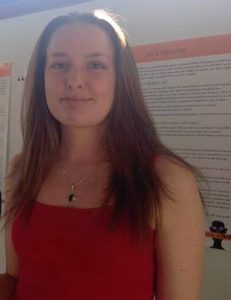 Lucia Crowther graduated in 2015 with a degree in Italian and History of Art. An excellent and committed student throughout her degree, Lucia was the recipient of the Meneghello-Italianist UG Prize for outstanding academic achievements in Italian Studies. Her dissertation entitled ‘The architectural formalisation of pilgrimage in the portico of the Madonna di San Luca’ was awarded the prestigious British-Italian Society Memorial Rooke Prize for the best UG dissertation in Italian Studies in 2016.
Lucia Crowther graduated in 2015 with a degree in Italian and History of Art. An excellent and committed student throughout her degree, Lucia was the recipient of the Meneghello-Italianist UG Prize for outstanding academic achievements in Italian Studies. Her dissertation entitled ‘The architectural formalisation of pilgrimage in the portico of the Madonna di San Luca’ was awarded the prestigious British-Italian Society Memorial Rooke Prize for the best UG dissertation in Italian Studies in 2016. On 4th September 2015 Reading University’s Alumni Office was kind enough to organise a guided tour for the 6 of us celebrating, with our partners, the 50th anniversary of our freshman year.
On 4th September 2015 Reading University’s Alumni Office was kind enough to organise a guided tour for the 6 of us celebrating, with our partners, the 50th anniversary of our freshman year. We then moved on to the Language Department of HUMSS where five of us had enrolled for French or French combined with Italian and one for Classics. The foyer of the building seemed little changed and served to jog a memory of being press-ganged into doing Linguistics as our third subject, totally unappreciative of how privileged we were to be some of the first of David Crystal’s students! Here we met up with Dr Veronica heath who had herself been a student in the 80s, taught by many of the profs and lectures who variously inspired, amused and scared us witless. Much nostalgia was evoked by names from the past, including Prof Lehmann, Michael Holland, Dr Dale, Dr Redfem, Geoffrey Strickland, Prof Meneghello, Dr Lepsky and John Scott to name but a few. All of us spent out third year in
We then moved on to the Language Department of HUMSS where five of us had enrolled for French or French combined with Italian and one for Classics. The foyer of the building seemed little changed and served to jog a memory of being press-ganged into doing Linguistics as our third subject, totally unappreciative of how privileged we were to be some of the first of David Crystal’s students! Here we met up with Dr Veronica heath who had herself been a student in the 80s, taught by many of the profs and lectures who variously inspired, amused and scared us witless. Much nostalgia was evoked by names from the past, including Prof Lehmann, Michael Holland, Dr Dale, Dr Redfem, Geoffrey Strickland, Prof Meneghello, Dr Lepsky and John Scott to name but a few. All of us spent out third year in 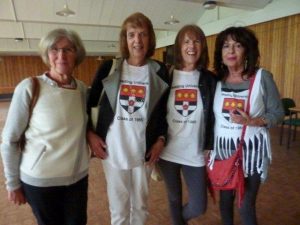 Lyon, those there for the whole year witnessing Les Événements of May 1968 at the first hand. It was here that our long-lasting friendship was cemented.
Lyon, those there for the whole year witnessing Les Événements of May 1968 at the first hand. It was here that our long-lasting friendship was cemented.


